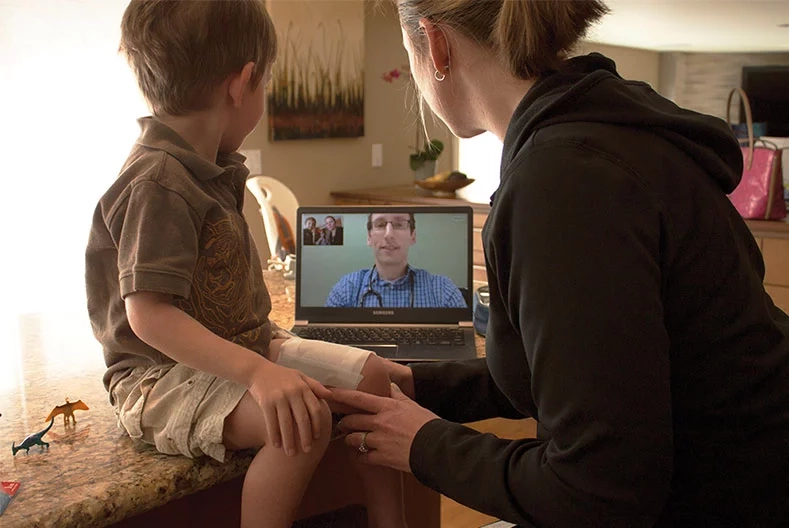Development and opportunities for telemedicine

Health innovation is constant, whether on the practices or technologies level. And among the innovative practices we find telemedicine that is the possibility of having a remote medical consultation. This practice still under-represented in France, will be encouraged with the introduction of the teleconsultations reimbursement from September 15, 2018.
What is telemedicine ?
Regulated in France since 2009, telemedicine is a form of remote medical practice using information and communication technologies that allows the patient to consult a doctor remotely through a screen.
There are several types of medical procedures made possible by telemedicine:
- Teleconsultation: as its name indicates, it’s a remote consultation by a health professional
- Tele-expertise: communication between two health professionals who wish to exchange medical advice. It allows to have a second opinion on a diagnosis.
- Telemonitoring: use of devices for interpreting a patient’s medical data remotely to make a diagnosis.
- Medical tele-assistance: remote intervention by a colleague doctor when performing a medical procedure.
- The medical response provided in the context of emergency medical assistance service (SAMU).
What are the practices today?
Waiting times to get a medical appointment today in France are constantly increasing. The average time to obtain an appointment with a specialist practitioner has increased from 48 to 61 days in five years. As for the general practitioner, we must now wait a week to get an appointment, nearly double what in was in 2012.
In this context, telemedicine could be one of the possible ways to improve access to the healthcare system.
2014 marks a turning point, since experimental teleconsulation pilots have been launched in France by the Regional Health Agencies, including the implementation of teleconsultations for dependent elderly care establishments (EHPAD, for its French acronym) and some general practitioners.
However, telemedicine is still rarely used. As proof, only 3% of French people would have already experimented video-consultations and social security records only 0.3% of telemedicine acts.
A majority of French people actually approve this kind of practice. According to a study conducted in 2017 by BVA, 42% of French people are interested in inteleconsultation and feel ready to have an online consultation, mainly for the following uses:
- Renew a prescription
- Ask for direct advice from a practitioner
- Treat “simple” ailments such a cold
- Have a second opinion from a doctor
- Address an intimate health topic with discretion
The reimbursement of telemedicine to promote its development
The test procedures introduced since 2014 have convinced private and public stakeholders of the usefulness of these solutions, but also to take the measure of a slow appropriation of use that can be explained, among other reasons, by the non-reimbursement by the CNAM (French National Health Insurance Fund). However it is possible to predict that this break to its expansion will disappear from September 15, 2018, the date from which the Health Insurance will reimburse the teleconsultations at the same price as office consultations: 25 € for generalists and 30 € for specialists. Patients will then have the choice, in case of incapacity to go to the doctor or when travelling, to consult remotely their doctor if him/her is equipped or to call a doctor registered on a teleconsultation platform.
To teleconsult, doctors will have a number of formalities to complete as a professional insurance declaration. They must also subscribe to a platform approved by the ARS (Regional Health Agency) with an agreement for health data storage (HADS approved server). They wont’ need any heavy equipment since the computer (or tablet) webcam is enough. To encourage doctors to adopt telemedicine, the CNAM has planned financial measures.
Quality of experience and data security: key factors for the success of telemedicine
Today, the legislative and economic conditions are now in place to ensure our health system takes full advantage of the telemedicine benefits. However, the speed of appropriation of these new uses will depend in particular on their fit with the users’ needs, the ability of these users to project themselves into a new healthcare configuratiob and the quality of the first experiences between patients and doctors.
This places high demands on the various actors of telemedicine concerning the quality of service of the audio/video communications and the protection of the patients personal data. Telemedicine platforms will need to ensure high-quality (uninterrupted and high-definition) communications and compliance with the Personal Health Data Hosting Modalities (HADS) provided by the Public Health Code.
Savings promised by telemedicine
A study done by the University of California- Davis evaluated the impact of telemedicine in three ways: saving time, reducing travel and reducing environmental impact.
This study shows short term savings of 150 € per consultation. And in the longer term (9 years in the case of the study) a reduction of 8.6 million km traveled.
Moreover, the study highlights that beyond the economic results, the patient comfort and the health professionals satisfaction are greatly improved.
Questions about our solutions for telemedicine?



